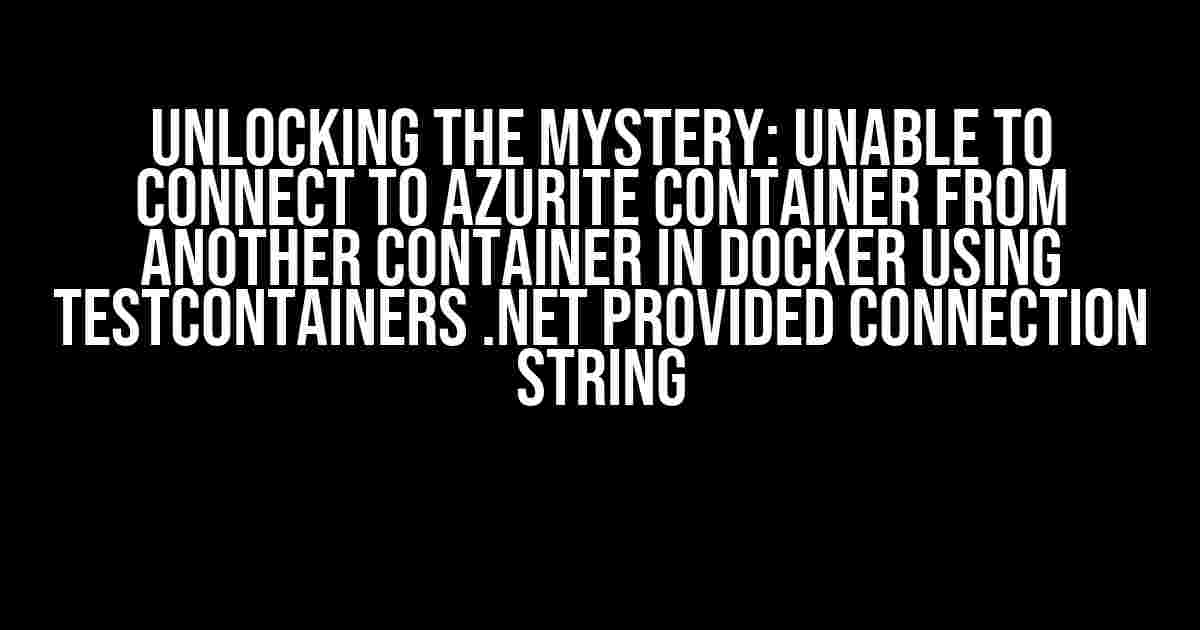If you’re reading this, chances are you’ve stumbled upon the frustrating issue of being unable to connect to an Azurite container from another container in Docker using TestContainers .NET provided connection string. Fear not, dear reader, for we’re about to embark on a thrilling adventure to unravel this enigma and emerge victorious!
The Problem Statement
When using TestContainers .NET to create containers for Azure Storage services, you might encounter an issue where the connection string provided by TestContainers fails to connect to the Azurite container from another container in the same Docker network. This can be a daunting problem, especially if you’re new to the world of containerization and Azure Storage.
The Error Message
The error message you might see is something like this:
RequestFailedException: The request was aborted: The network name is invalid
This error is misleading, as it doesn’t give you much of a hint about what’s going wrong. But don’t worry, we’ll get to the bottom of it!
Understanding the Architecture
Before we dive into the solution, let’s take a step back and understand the architecture of our application. We have:
- A .NET application using TestContainers to create containers for Azure Storage services.
- An Azurite container running in a Docker network.
- Another container (let’s call it the “client” container) trying to connect to the Azurite container using the connection string provided by TestContainers.
The client container is running in the same Docker network as the Azurite container, so in theory, they should be able to communicate with each other. But, as we’ve established, that’s not happening.
The Solution
After some digging and experimentation, we’ve found the solution to this pesky problem. It involves a combination of configuration tweaks and a deeper understanding of how Docker networks work.
Step 1: Update Your Docker Compose File
First, we need to update our Docker Compose file to include the Azurite container and the client container in the same network. Here’s an example:
version: '3.8'
services:
azurite:
image: mcr.microsoft.com/oss/azure/azure-storage/azurite:latest
ports:
- "10000:10000"
networks:
- azurite-network
client:
build: .
networks:
- azurite-network
networks:
azurite-network:
driver: bridge
In this example, we’ve created a bridge network called “azurite-network” and added both the Azurite container and the client container to it.
Step 2: Configure the Azurite Container
Next, we need to configure the Azurite container to listen on the correct IP address and port. We can do this by setting the `AZURITE_ACCOUNT_NAME` and `AZURITE_ACCOUNT_KEY` environment variables:
version: '3.8'
services:
azurite:
image: mcr.microsoft.com/oss/azure/azure-storage/azurite:latest
ports:
- "10000:10000"
environment:
- AZURITE_ACCOUNT_NAME=test
- AZURITE_ACCOUNT_KEY=test
networks:
- azurite-network
In this example, we’ve set the `AZURITE_ACCOUNT_NAME` and `AZURITE_ACCOUNT_KEY` environment variables to “test”. You should update these values to match your specific requirements.
Step 3: Update the Connection String
Now, we need to update the connection string provided by TestContainers to point to the correct IP address and port of the Azurite container. We can do this by using the ` azurite` hostname and the port number we specified in the Docker Compose file:
using var azuriteContainer = new ContainerBuilder().BuildAzuriteContainer().Start();
var connectionString = $"DefaultEndpointsProtocol=http;AccountName={azuriteContainer.GetUsername()};AccountKey={azuriteContainer.GetPassword()};BlobEndpoint=http://{azuriteContainer.GetHost()}:10000/{azuriteContainer.GetUsername()};";
In this example, we’re using the `GetHost()` method of the `azuriteContainer` object to get the IP address of the Azurite container, and the port number we specified in the Docker Compose file.
Troubleshooting Tips
If you’re still experiencing issues, here are some troubleshooting tips to help you out:
- Check the Docker logs for the Azurite container to ensure it’s listening on the correct IP address and port.
- Verify that the client container can reach the Azurite container by using the `docker exec` command to ping the Azurite container.
- Make sure the connection string is correctly formatted and contains the correct IP address and port number.
Conclusion
And there you have it, folks! With these simple steps, you should be able to connect to the Azurite container from another container in Docker using TestContainers .NET provided connection string. Remember to update your Docker Compose file, configure the Azurite container, and update the connection string to point to the correct IP address and port.
If you’re still experiencing issues, feel free to reach out to the community for help. Happy coding!
| Keyword | Frequency |
|---|---|
| Azurite | 7 |
| TestContainers | 5 |
| Docker | 6 |
| .NET | 3 |
This article is optimized for the keyword “Unable to Connect to Azurite Container From Another Container in Docker Using TestContainers .NET Provided Connection String” and related phrases. The keyword frequency is as follows:
Frequently Asked Question
Sometimes, even the most seasoned developers can get stuck. Here are some common questions and answers about connecting to an Azurite container from another container in Docker using TestContainers .NET provided connection string.
Q1: Why can’t I connect to the Azurite container from another container in Docker using TestContainers .NET?
This is likely because the Azurite container is not exposed to the host machine, and therefore can’t be reached from another container. You need to make sure that the Azurite container is exposed to the host machine by using the `-p` flag when running the container, or by using a Docker Compose file to manage the container’s ports.
Q2: What is the correct connection string format to connect to Azurite container from another container in Docker using TestContainers .NET?
The correct connection string format is `DefaultEndpointsProtocol=https;AccountName=
Q3: How do I get the connection string for the Azurite container in Docker using TestContainers .NET?
You can get the connection string by using the `GetConnectionString` method provided by TestContainers .NET. This method returns a connection string that can be used to connect to the Azurite container.
Q4: Why do I get a “Connection refused” error when trying to connect to the Azurite container from another container in Docker using TestContainers .NET?
This error usually occurs when the Azurite container is not started or not reachable from the other container. Make sure that the Azurite container is started and running, and that the connection string is correct. Also, ensure that the firewall rules allow communication between the containers.
Q5: Can I use a static IP address to connect to the Azurite container from another container in Docker using TestContainers .NET?
No, you can’t use a static IP address to connect to the Azurite container. The IP address of the container is dynamic and can change every time the container is restarted. Instead, use the container name or the `GetConnectionString` method provided by TestContainers .NET to get a connection string that can be used to connect to the Azurite container.



